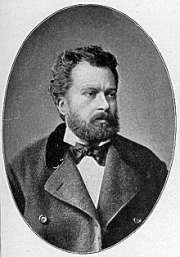|
Biyografi Namık Kemal
Namık Kemal (d. 21 Aralık 1840, Tekirdağ, ö. 2 Aralık 1888, Sakız Adası) Türk milliyetçiliğinin öncülerinden, Genç Osmanlı hareketi mensubu, ünlü Türk yazar, gazeteci, devlet adamı, șairdir.
Yurtseverlik, hürriyet, millet kavramlarına bağlı bir Tanzimat Devri aydınıdır. Bu kavramları Türk fikir hayatına ve edebiyatına sokan kiși kabul edilir[1]. Heyecanlı, kavgacı kișiliği, akıcı, parlak üslubu nedeniyle devrinin diğer yazarlarından daha fazla tanındı.“Vatan Șairi” ve “Hürriyet Șairi” olarak anılan Namık Kemal, șiirin yanı sıra tenkit, biyografi, tiyatro, roman, târih ve makale türlerinde eserler verdi. Özellikle "İntibah" isimli romanı ve "Vatan Yahut Silistre" isimli tiyatro oyunu ünlüdür. Türkiye Cumhuriyeti’nin kurucusu Mustafa Kemal Atatürk’ü eserleri ve fikirleriyle etkiledi. Muhalif bir gazeteci ve edebiyatçı olarak Osmanlı hükümetleri ile mücadele ederken devlet adamı olarak Gelibolu, Midilli, Rodos ve Sakız’da Osmanlı Devleti’ne bașarılı hizmetler vermiștir.
***
Namık Kemal, born as Mehmed Kemal (December 2, 1840 - December 2, 1888) was a Turkish nationalist poet, translator, journalist, and social reformer. He is among the most prolific authors of language materials for foreign students of the Turkish language.
Kemal was born in Tekirdağ to an Albanian mother Fatma Zehra and father Yenișehirli Mustafa Asım in the Ottoman Empire. He was influenced by the growing national sentiment of his day, and published a politically controversial newspaper. When the government cracked down on the newspaper he fled to Western Europe and worked there as a translator. When he returned, his most famous work, "Vatan Yahut Silistre", was staged at the Gedikpașa Theatre in Istanbul on April 1, 1873. The play promoted nationalism and liberalism, and was considered dangerous by the Ottoman government. Immediately afterward, on April 9, 1873, he was sent into exile by the Ottoman Sultan and imprisoned in Cyprus. He was pardoned by Murat V on June 3, 1876, and returned to Istanbul (Constantinople) on June 29, 1876. He later became the governor of Sakız (now Chios, Greece), where he died in 1888. He was laid to rest in Bolayır, Çanakkale Province on the Gallipoli Peninsula.
Some of his most famous works are "Rüya", "Zavallı Çocuk", "Kerbela", "Akif Bey", "Gülnihal", "İntibah" and "Emir Nevruz". Some were published with pseudonyms, and others were published anonymously.
In 1867, he published an article in which he ascribed the Muslim world's inferiority to the West to its norms for relations between the sexes: "The reason for backwardness is the way we treat our women, treating them only as suitable for producing children and nothing else."
Kemal's patriotic writings became a source of inspiration for Mustafa Kemal Atatürk, the leader of the Turkish nationalist movement and the founder of the Republic of Turkey.
|





